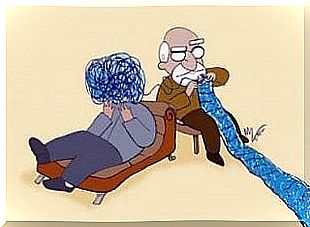What Is The Relationship Between Mood And Health?

For decades, experts have wondered whether diseases are somehow related to emotions and feelings. Today they are focused on studying the link between mood and health.
We know that pain we have depends to some extent on how we perceive it, as well as on our state of mind. Although experts know the biological origins of some diseases, they still cannot explain all aspects of them. Therefore, many professionals suggest a possible psychological origin.
However, when we enter this area, it is much less clear what mechanisms and moods might influence our health. This is because we have to take into account a wide range of social, cognitive, physiological and behavioral factors. These mechanisms can also have a direct or indirect influence on disease.

The link between emotional mood and health
Emotions can affect how our bodies function. There are many indications that negative emotions influence the duration of infections, vulnerability and healing processes.
This may be because a positive mood promotes the secretion of a first-line antibody: secretory immunoglobulin A. This substance can, for example, protect people against the common cold.
So your mood could increase or decrease your immune system’s response to a disease or condition. Experts have noted that people with negative moods or mindsets are more prone to catch a cold. They also have less resistance to more serious diseases.
Subjective health status
Emotions not only directly determine physiological factors, but can also condition your thoughts. In other words, a negative mood would make it easier to have more negative thoughts. For example, you would recognize physical symptoms and interpret them as a possible health problem.
In this regard, experts have found that when the study participants were sad, they said they had more symptoms. This is because people with more negative emotions tend to be more alert to how their bodies feel. Therefore, even the slightest sign of pain or any new feeling will worry them more than positive people.
Seek medical help
In connection with what we mentioned above, you might think that people who are more concerned about their bodies and their health are more likely to see a specialist. However, studies show that the opposite is true.
It seems that people who are not feeling well feel that they are less able to take care of their health. As a result, they visit the doctor less often. It’s as if they think they can’t do anything to improve their situation anyway.
In addition, they may attribute their symptoms to their moods and thereby delay getting expert help. Conversely, if a person feels better about themselves, they are more likely to be motivated to stay healthy and take care of themselves.
On the other hand, it seems that mood and medical assistance are also related to the ability to deal with potentially negative news. They see going to the doctor as a threat, as they may receive some disturbing news.

healthy behavior
In addition to directly affecting your body and your perception of illness, your mood also influences your behavior and actions. If you’re in a bad mood, you probably tend to eat less healthily, consume more alcohol, exercise less, and so on.
When talking about tobacco use, for example, most smokers say they use tobacco to regulate or improve their mood or to reduce their stress levels.
In general, these behavioral patterns seem to function as regulators. They somehow control the influence of mood on health. We do this to make ourselves feel better or to reduce negative feelings. Thus, these behavioral patterns are directly related to health.
As a result, if you increase your unhealthy behavior because of your negative mood, your health will be affected in the short and long term.
Mood and health: what should you do?
So now you know that it is inevitable that you will experience negative emotions. Therefore, you need to make sure that you adopt healthy habits in your life.
These habits, while sometimes clouded by your mood, will help offset some of the harmful effects. In addition, even if your mood changes, if you have a wide repertoire of coping behaviors, the worries will be more bearable and their effects less severe.









